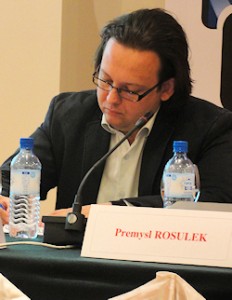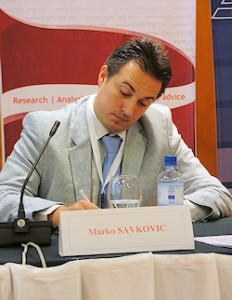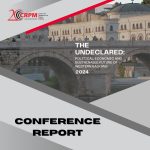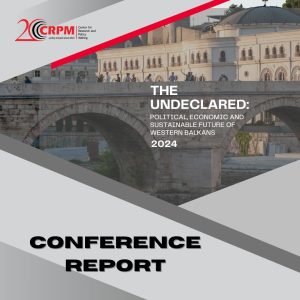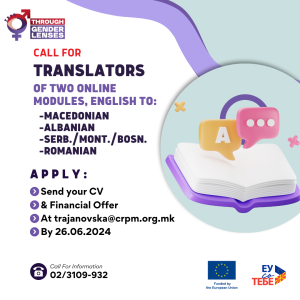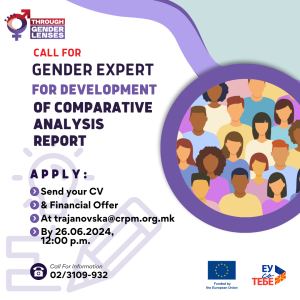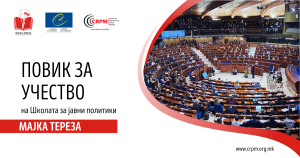Summary
The Center for Research and Policy Making, in partnership with the local offices of the German political foundations Kondrad Adenauer Stiftung and Friedrich Ebert Stiftung, as well as the Think Tank Fund of the Institute Open Society from Budapest, organized an international scholarly conference dedicated to the tenth anniversary of the signing of the Ohrid Framework Agreement.
The conference, named “One Decade after Ohrid Framework Agreement: Lessons to be Learned from the Macedonian Experience” was held in Skopje, in the hotel Continental, in the days of June 24-26, 2011.

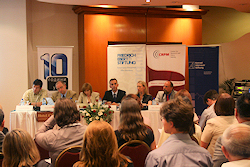 Speakers at the opening of the conference were the resident representatives of Friedrich Ebert Stiftung and Kondrad Adenauer Stiftung, Mr. Heinz Bongartz and Ms. Anja Czymmeck and the director of the Open Society Institute Think-Tank fund, Mr. Goran Buldioski. Mr. AbdulaqimAdemi , Vice-Prime Minister of the Government of Republic of Macedonia, responsible for the implementation of the Ohrid Framework Agreement and Professor Florian Bieber from the University of Graz were the special guest speakers at the opening session.
Speakers at the opening of the conference were the resident representatives of Friedrich Ebert Stiftung and Kondrad Adenauer Stiftung, Mr. Heinz Bongartz and Ms. Anja Czymmeck and the director of the Open Society Institute Think-Tank fund, Mr. Goran Buldioski. Mr. AbdulaqimAdemi , Vice-Prime Minister of the Government of Republic of Macedonia, responsible for the implementation of the Ohrid Framework Agreement and Professor Florian Bieber from the University of Graz were the special guest speakers at the opening session.
The conference was opened by Dr. Marija Risteska, Executive director of the Center for Research and Policy Making, with short introduction and reading of the welcoming letter sent by the president of the Republic of Macedonia, Dr. Gjorge Ivanov.
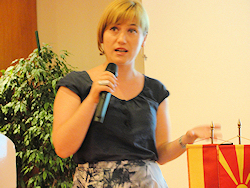 The conference welcomed renowned social science scholars and practitioners in various fields. Florian Bieber, head of the Centre for Southeast European Studies at the University of Graz, delivered the keynote speech at the opening session. The rest of the panels were chaired by notable academics from Macedonia and abroad: Ljubomir Frchkoski, a professor at the University Ss Cyril and Methodius, Skopje and one of the people involved in drafting the letter of the OFA; Vasiliki Neofotistos, assistant professor at the State University of New York in Buffalo; Stojan Saveski, Dean at the European University, Skopje; Gordana Siljanovska, Full professor at the University Ss Cyril and Methodius; Zhidas Daskalovski, Head of the Public Policy Department, University St Clement of Ohrid, Bitola; Neophytos Loizides, professor at the Queen’s University Belfast / University of Kent; and Simonida Kacarska, PhD student at the University of Leeds, replacing professor Biljana Vankovska from the University Ss Cyril and Methodius.
The conference welcomed renowned social science scholars and practitioners in various fields. Florian Bieber, head of the Centre for Southeast European Studies at the University of Graz, delivered the keynote speech at the opening session. The rest of the panels were chaired by notable academics from Macedonia and abroad: Ljubomir Frchkoski, a professor at the University Ss Cyril and Methodius, Skopje and one of the people involved in drafting the letter of the OFA; Vasiliki Neofotistos, assistant professor at the State University of New York in Buffalo; Stojan Saveski, Dean at the European University, Skopje; Gordana Siljanovska, Full professor at the University Ss Cyril and Methodius; Zhidas Daskalovski, Head of the Public Policy Department, University St Clement of Ohrid, Bitola; Neophytos Loizides, professor at the Queen’s University Belfast / University of Kent; and Simonida Kacarska, PhD student at the University of Leeds, replacing professor Biljana Vankovska from the University Ss Cyril and Methodius.
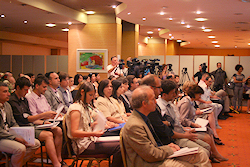 In total, twenty five papers were presented within the seven panels of the conference. We also held an additional panel dedicated to the initiative of RECOM at the last day of the conference, before the closing session.
In total, twenty five papers were presented within the seven panels of the conference. We also held an additional panel dedicated to the initiative of RECOM at the last day of the conference, before the closing session.
Each of the panels discussed the different perspective of the OFA and the implication of the agreement for Macedonia and the Balkans in the past ten years. You can see the list of panels below.
Panel 1: The conflict, the agreement and the reconciliation: 2001 then and now
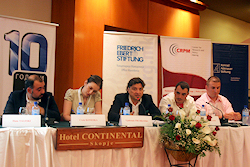
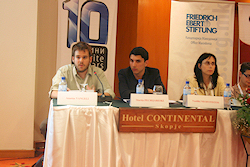
Panel 2: Political belonging in post-2001 Macedonia: the authority of “ethnic identities”
Panel 3: The Ohrid Framework Agreement in the Southeast European context
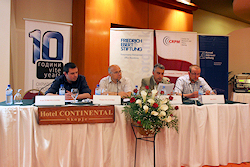
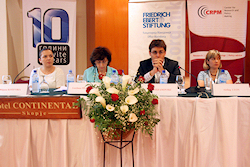
Panel 4: Decentralization reform after OFA: towards greater power sharing or effective and efficient service delivery?
Panel 5: Equitable representation for “non-majority communities” in Macedonia – Until when?
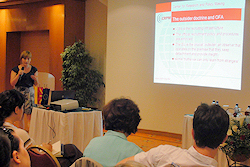
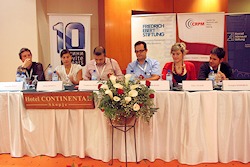
Panel 6: The future of Macedonia and the region
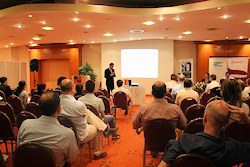
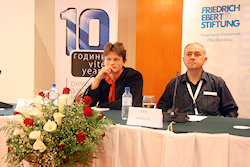
Panel 7: Lessons learned
Special panel on the initaitive for RECOM
The closing session of the conference provided short summaries from all panels.
A team of seven rapporteurs, members and associates of the CRPM as well as conference participants carefully followed the presentations and the discussions at each panel and presented the main points in the closing sessions.
More than 100 participants and guests attended the panels throughout all the three days of the conference.
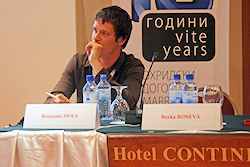
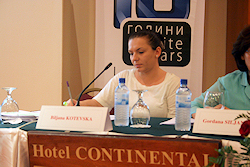
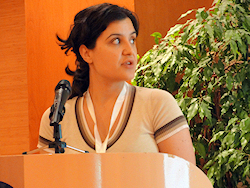
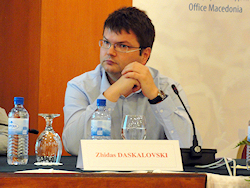
The conference started with more than 120 guests, including media representatives, at the opening and the first day of the conference, and ended with approximately 60 participants at the last day. On-line registration was required for participants for all potential participants. However, as we were expecting, not all of the participants at the conference had completed the on-line entry form.
The conference had high visibility in local, national and regional media. The press found the topic and the selection of guests and presenters very attractive and treated the event as one of exceptional importance. In the course of the preparations for the conference and throughout the event, we were supported by two media outlets: the regional promotion was supported by the leading regional news portal Balkan Insights and the local support was provided from the cable TV station 24 Vesti .
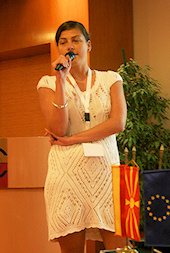
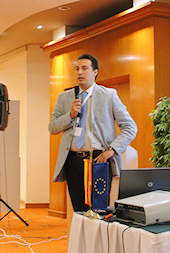
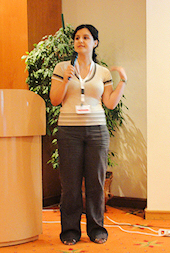
In addition to the notable media support, the conference reached to high visibility through the on-line promotion that was provided by the CRPM team. We have established a separate web page for the conference (www.policy.mk/ofa11), created a Facebook Event and shared important information and updates regarding the conference at the FanPage of the CRPM (www.facebook.com/crpm.org.mk) , mailing lists and other social media platforms and tools.
In August 2011, the CRPM will announce the details regarding the publication of a selection of the conference papers in a special edited volume. In the meantime, the CRPM announced another international conference to be held in September, devoted to the 20 years of Macedonian independence.
Photos from the conference can be found on this link.
CONFERENCE PROGRAM
Friday 24th June 2011
12:00 – 13:30 > Opening of the conference
Marija Risteska, Executive Director of the Center for Research and Policy Making
Abdulaqim Ademi, Vice-Prime Minister of the Government of Republic of Macedonia, responsible for the implementation of the Ohrid Framework Agreement
Heinz Bongartz, Resident Representative of the Friedrich Ebert Stiftung
Anja Czymmeck, Resident Representative of the Konrad Adenauer Stiftung
Goran Buldioski, Director of the Open Society Institute Think Tank Fund
Keynote speaker: Florian Bieber, Centre for Southeast European Studies, University of Graz
13:30 -14:30 > Lunch
14:30 – 16:00 > Panel 1: The conflict, the agreement and the reconciliation: 2001 then and now
Panel Chair: Ljubomir Frchkoski, University Ss Cyril and Methodius, Skopje
Papers:
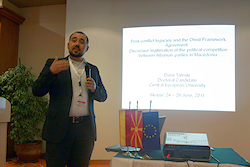 Dane Taleski, Central European University, Budapest. Post-conflict Legacies and the Ohrid Framework Agreement: Discursive Legitimation of the Political Competition Between Albanian Parties in Macedonia.
Dane Taleski, Central European University, Budapest. Post-conflict Legacies and the Ohrid Framework Agreement: Discursive Legitimation of the Political Competition Between Albanian Parties in Macedonia.
Papakostas Nikolaos, Institute of International and Economic Relations, Athens. The Role of Organized Crime Groups on the Eruption of 2001 Conflict and on the Reconciliation Process.
Oliver Stanoeski, University Ss Cyril and Methodius. One Decade Living on the margins: the Unfinished Task of the Peace-Building Process in Macedonia.
Cvete Koneska, University of Oxford. Power-sharing and Power-dividing: Education and Decentralization Policies in Post 2001 Macedonia.
16:00 -16:30 > Coffee break
16:30 – 18:00 > Panel 2: Political belonging in post-2001 Macedonia: the authority of “ethnic identities”
Chair: Vasiliki Neofotistos, Assistant Professor, University of Buffalo
Papers:
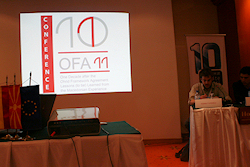 Franziska Blomberg, Europa-Universität Viadrina, Frankfurt am Oder. Democratic Spill-Over of Civil Society in Ethno-Nationally Divided Societies? – External Democracy Promotion in Macedonia and Bosnia-Herzegovina.
Franziska Blomberg, Europa-Universität Viadrina, Frankfurt am Oder. Democratic Spill-Over of Civil Society in Ethno-Nationally Divided Societies? – External Democracy Promotion in Macedonia and Bosnia-Herzegovina.
Ljubica Spaskovska, University of Exeter. The Fractured ‘We’ and the Ethno-national ‘I’ – From Citizenship to Ethnizenship.
Anastas Vangeli, Center for Research and Policy Making. Heritage, Loyalty, Membership: Semantics of Belonging in Contemporary Macedonia.
Martin Pechijareski, Central European University. The Role of Inter-ethnic Conflicts on the Integration of the Macedonian Society.
Saturday 25th June 2011
9:30 – 11:00 > Panel 3: The Ohrid Framework Agreement in the Southeast European context
Chair: Stojan Slaveski, European University, Skopje
Papers:
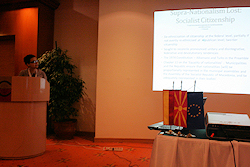 Jan Mus, Warsaw School of Social Science and Humanities. How Much Politics in Ethnicity and Ethnicity in Politics?
Jan Mus, Warsaw School of Social Science and Humanities. How Much Politics in Ethnicity and Ethnicity in Politics?
Ivan Toromanoski, Independent Researcher. Internationalism and Nationalism: Critically re-framing the Ohrid Framework Agreement.
Plamen Dimitrov, Bulgarian Geopolitical Society, Sofia. Ohrid Framework Agreement and its Implications for the Balkan Geopolitical Status Quo.
11:00 – 11:30 > Coffee break
11:30 – 13:00 > Panel 4: Decentralization reform after OFA: towards greater power sharing or effective and efficient service delivery?
Chair: Gordana Siljanovska, University Ss Cyril and Methodius
Papers:
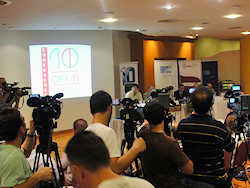 Elena Davitkovska, University Ss Cyril and Methodius and Ivan Stefanovski, Civic Association MOST, Skopje. The Future of Good Governence in Ethnically Mixed Municipalities in Macedonia.
Elena Davitkovska, University Ss Cyril and Methodius and Ivan Stefanovski, Civic Association MOST, Skopje. The Future of Good Governence in Ethnically Mixed Municipalities in Macedonia.
Biljana Kotevska, Centre for Regional Policy Research and Cooperation “Studiorum,” Skopje. Towards Effective Political Participation of “Small Ethnic Communities ” in Local Self-government in Macedonia (Impact of the Ohrid Framework Agreement)
Aisling Lyon, University of Bradford. Municipal Decentralisation: Between the Integration and Accommodation of Ethnic Difference in the Republic of Macedonia.
13:30 -14:30 > Lunch
14:30 – 16:00 > Panel 5: Equitable representation for “non-majority communities” in Macedonia – Until when?
Chair: Zhidas Daskalovski, University St Clement of Ohrid, Bitola, Macedonia
Papers:
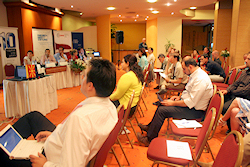 Simonida Kacarska, University of Leeds. Equitable Representation in the EU conditionality.
Simonida Kacarska, University of Leeds. Equitable Representation in the EU conditionality.
Marija Risteska, Center for Research and Policy Making. Insiders and Outsiders: Revisiting the Principle of Just and Equal Representation of Minority Groups in Macedonian Public Administration.
Jana Lozanoska, Independent Consultant, Skopje. Principle of non-Discrimination and Equitable Representation in Ohrid Framework Agreement Ten Years After – Formal or Substantive Equality?!
16:00 -16:30 > Coffee break
16:30 – 18:00 > Panel 6: The future of Macedonia and the region
Chair: Neophytos Loizides, Queen’s University Belfast / University of Kent.
Papers:
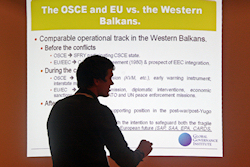 Benjamin Mols, Global Governance Institute, Brussels. The OSCE in the Western Balkans: Offering the Nescesary Future Perspectives for a Neglected Organisation.
Benjamin Mols, Global Governance Institute, Brussels. The OSCE in the Western Balkans: Offering the Nescesary Future Perspectives for a Neglected Organisation.
Boyka Boneva, Institute for International Economic Relations, Athens. The Role of Bulgaria and Greece as Catalytic Factors for the European Future of the Western Balkans.
Georgios Kokkalis and Elina Makri, Cafe Babel, Athens. The ‘’New’’ Macedonian Question: The Former Yugoslav Republic of Macedonia and Greece.
Olsi Baze. Kristal University, Tirana. The Role of the Albanian Factor on the EU Integration Perspective of the Region.
Sunday 26th June, 2011
9:30 – 11:00 > Panel 7: Lessons learned
Chair: Biljana Vankovska, University Ss Cyril and Methodius, Skopje.
Papers:
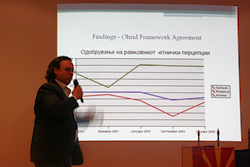 Nenad Markovic, University Ss Cyril and Methodius, Skopje. Fears and Lessons Learned from the Implementation of the Ohrid Framework Agreement (2001-2011).
Nenad Markovic, University Ss Cyril and Methodius, Skopje. Fears and Lessons Learned from the Implementation of the Ohrid Framework Agreement (2001-2011).
Premysl Rosulek, University of West Bohemia, Pilsen. Macedonia in 2011: Stabilization or “Before the Framework Agreement II.”
Marko Savkovic, Centre for Security Policy, Belgrade. Reaching OFA: What Valuable Lessons are There for Mediators of the Future?
Dusan Janjic, Institute for Social Sciences, Belgrade. Macedonia: A No Noticed Crisis?
11:00 – 11:30 > Coffee break
11:30 – 13:00 > Special panel on The Initiative for RECOM
Speaker: Thomas Kohls, representative of the Network promoting the Initiative for RECOM towards the establishment of a Regional Commission Tasked with Establishing the Facts about All Victims of War Crimes and Other Serious Human Rights Violations Committed on the Territory of the Former Yugoslavia in the period from 1991-2001
13.30 – 14.30 > Lunch
14.30 – 16.00 > Closing of the conference
Moderator: Marija Risteska, Center for Research and Policy Making, Skopje

